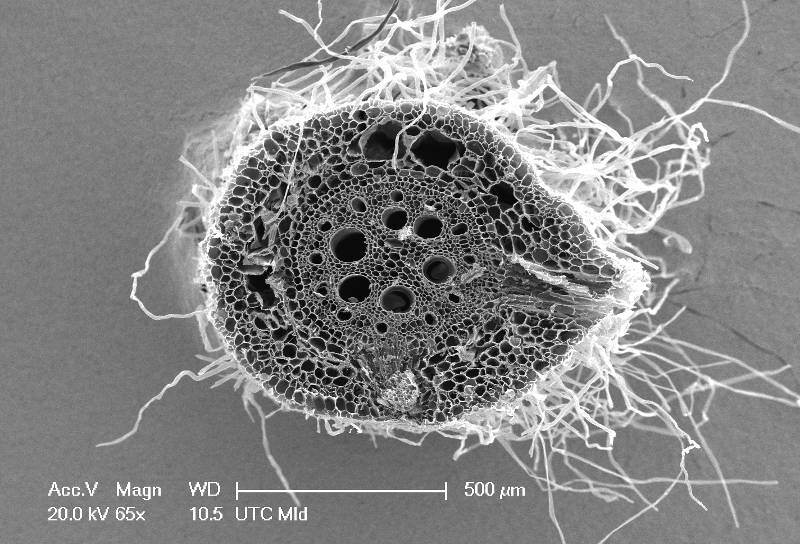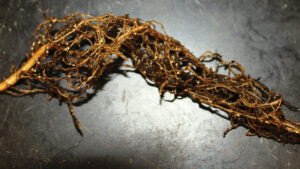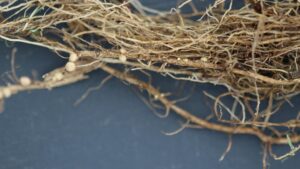Nematodes pose a serious threat to a wide range of crops. Although the damage they cause is obvious, most farmers know little about nematodes or even choose to ignore them since they are more or less invisible.
Gregory Ginisty, Senior Product Manager, Bayer SeedGrowth, explains: “Nematodes are the number one yield robber in U.S. soybean production. The soybean cyst nematode (SCN), which has been documented in every soybean-growing state, accounted for around 120 million bushels of yield loss in 2014, which added up to a revenue loss of some $1bn. SCN can cut yields by up to 30% without any visual signs of a problem.”
The SCN is widely present and spreading fast. When SCN enters a soybean plant to feed, it damages the roots and deprives the plant of water and nutrients. Even more serious is the fact that the puncture wounds generated by SCN allow diseases to enter the roots. Of these diseases the fungal sudden death syndrome (SDS) is the most deadly. Thus, SCN infestation can result in much worse devastation through SDS.
Triple-action soybean protection
Bayer was one of the first companies to recognize the severity of the nematode problem and initiated research projects around the world to develop innovative crop protection solutions. Used together on soybeans, Bayer’s seed treatment products Poncho™/VOTiVO™ + ILeVO™ deliver triple-action protection against nematodes, insects and diseases (including SDS) – and are the only crop protection solution on the market that is effective against all relevant nematode species and SDS.
VOTiVO, which contains the bacterium Bacillus firmus, colonizes soybean roots, increases root growth and prevents nematode damage; Poncho’s systemic mode of action protects the entire plant against insects during its early development; and ILeVO protects the plant’s root, kills all nematode species in the seed zone by disrupting nematode respiration, and controls Fusarium root rot, the causal agent of SDS, at the initial infection site.
This unmatched triple action protects soybean plants against first- and second-generation nematodes through ILeVO and VOTiVO respectively; and by the time the third-generation nematodes appear, the plants are strong enough to resist them, not least thanks to the growth-boosting effects of Poncho/VOTiVO. In soybean field trials this triple-action protection has been seen to bring an average yield advantage of 5.4 bushels per acre.
U.S. corn and cotton solutions
Corn growers in the U.S. have been able to combat nematodes since 2011 when Bayer combined Poncho, the most trusted seed-applied insecticide, with VOTiVO, a revolutionary biological solution to protect the corn plant’s root system from nematodes. The uniqueness of VOTiVO is that the bacterial spores germinate at the same time as the seed and colonize the roots as they grow. As a result, growers have seen an average yield increase of 10 bushels per acre with Poncho/VOTiVO compared to seed treated with a fungicide system. The added value this seed-applied solution brought U.S. corn growers has made Poncho/VOTiVO the #1 seed treatment in the USA and it is applied on over 40 million acres of corn each year.
“For cotton we are launching a brand-new solution in 2016. A version of ILeVO specially developed for cotton and branded as COPeO Prime will be marketed to provide further seed-applied protection against nematodes,” Gregory Ginisty says. For cotton farmers in the U.S. Bayer offers a dual-action seed-applied solution made up of Aeris, a seed-applied insecticide/nematicide, and COPeO Prime. This combination not only combats aphids, thrips and cutworms, but also delivers highly effective added protection against nematodes.
Bayer’s nematode research
“We are focusing on complementary innovative approaches in new environmentally favorable chemicals, biologicals, traits and breeding”, says Dr. Jürgen Benting, a Bayer researcher specializing in nematodes. “For example, we screen as many as 100,000 small-molecule compounds a year for nematicidal efficacy before going on to greenhouse testing and, ultimately, field trials on the few substances that are left.”
One chemical solution, fluopyram, showed impressive broad-spectrum nematicidal potential at very low rates. This was confirmed in subsequent field trials in the U.S., Italy and South Africa as well as in laboratories and greenhouses in Germany. Marc Rist, another Bayer nematode specialist, explains how the active ingredient fluopyram works: “By preventing the formation of adenosine triphosphate molecules, or ATP for short, fluopyram interrupts the nematodes’ energy supply with the result that they become paralyzed and finally die.” But fluopyram, which is marketed as Velum, ILeVO, COPeO and Verango, is only one player in Bayer’s complementary approach to tackling the nematode problem.
Integrated crop solutions
As a leading biologicals expert, Dr. Varghese P. Thomas, points out, “Our current focus in biological research at Bayer is on VOTiVO with its nematode control and crop yield benefits, and BioAct (Paecilomyces lilacinus), a fungal biocontrol agent acting against the eggs and juveniles of plant-parasitic nematodes. We are using them alongside chemical solutions to implement biological solutions as an integral component of integrated crop solutions.” An application of the chemical solution fluopyram in target crops such as vegetables, fruit, coffee, corn, cotton, soybeans or sugarcane kills adult nematodes in the soil; the biological solution BioAct colonizes nematode eggs, penetrates the egg skin, and inhibits the hatching of larvae, thus preventing a new generation of nematodes from growing and damaging the plants at a later stage.
Bayer’s research and development work on chemical and biological crop protection products is complemented by its own research into traits to combat SCN and by cooperative research to breed nematode-resistant vegetable varieties. These strategies are delivering best-in-class integrated crop solutions to tackle, in particular, the plant-parasitic root knot and cyst nematodes that are damaging crops all over the world. Ironically enough, those invisible crop killers are now being defeated in part by biological agents such as VOTiVO and BioAct that are equally invisible to the naked eye. But soybean, corn or cotton growers are not much concerned about how the invisible threat from nematodes is tackled. They just want solutions. And Bayer is supplying them.
Read more on the Bayer SeedGrowth website: www.seedgrowth.bayer.com















